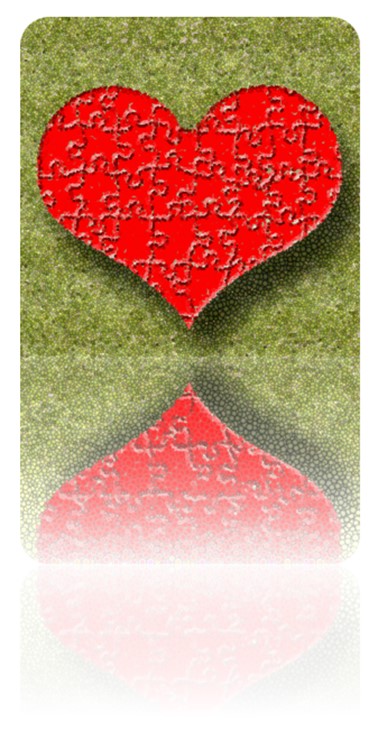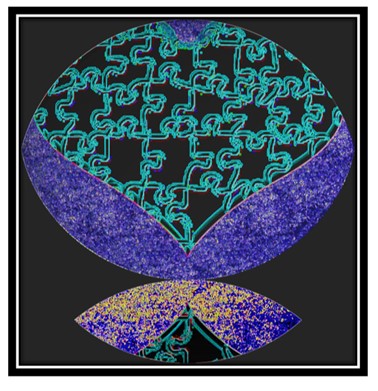Nephrotic Syndrome
HFpEF Articles Series
Conversation With ChatGPT4 October 2023

Heart Underlying Symptoms Abstract Artwork
F McCullough Copyright 2023 ©
Nephrotic Syndrome
Nephrotic syndrome is a kidney disorder characterised by a group of symptoms that indicate kidney damage. Specifically, this syndrome features high levels of protein in the urine (proteinuria), low levels of albumin in the blood (hypoalbuminemia), elevated blood lipid levels (hyperlipidemia), and swelling or oedema, especially in the ankles, feet, and around the eyes.
Causes Of Nephrotic Syndrome
Nephrotic syndrome can be caused by a variety of underlying conditions, both primary and secondary. Primary causes originate within the kidneys themselves and include diseases like minimal change disease, focal segmental glomerulosclerosis, and membranous nephropathy. Secondary causes may be systemic conditions that affect other parts of the body as well, such as diabetes, lupus, and certain infections.
Symptoms & Complications
In addition to the primary symptoms mentioned earlier, nephrotic syndrome can lead to:
Fatigue: Due to loss of proteins and other nutrients in the urine.
Risk of Infection: Lowered albumin levels can weaken the immune system.
Blood Clots: Protein loss can disrupt the balance of substances that prevent clotting.
Diagnosis & Treatment
Diagnosis typically involves urine tests to check for protein levels, blood tests to evaluate kidney function, and sometimes a kidney biopsy for a more definitive diagnosis. Treatment generally targets the underlying cause and may involve medications like corticosteroids, diuretics, or antihypertensives, as well as dietary changes aimed at reducing oedema and improving overall kidney function.
Role Of Artificial Intelligence
AI and machine learning algorithms could assist in diagnosing and managing nephrotic syndrome by analysing a wide array of data, including patient medical history, test results, and even genetic factors. This comprehensive analysis could help predict the likelihood of developing complications, monitor the effectiveness of treatments, and suggest adjustments to improve patient outcomes.
Consultation with healthcare providers is essential for the accurate diagnosis and appropriate treatment of nephrotic syndrome, especially in cases with multiple underlying conditions.
Conversation with Open AIís ChatGPT and Edited by F McCullough, Copyright 2023 ©
Disclaimer
Disclaimer: The information provided on this webpage is sourced from Chat GPT, an AI language model, and is intended for informational purposes only. While effort has been made to ensure the accuracy and completeness of the information presented, we cannot guarantee its reliability or appropriateness for every individual or situation. The content is not a substitute for professional medical advice, diagnosis, or treatment. We strongly encourage you to consult with a qualified healthcare professional before making any decisions or taking any actions based on the information provided here. We disclaim any liability for any consequences that may arise from the use or misuse of the information on this webpage.
Heart Failure With Ejection Fraction Index
Article Titles:
Anaemia
& Heart Failure With Preserved Ejection Fraction
Asthma
& Heart Failure With Preserved Ejection Fraction
Dizziness& Heart Failure With Preserved Ejection Fraction
Genetic Factors & Heart Failure With Preserved Ejection Fraction
Heart Failure With Preserved Ejection Fraction Terms Explained
Hypoxia & Heart Failure With Preserved Ejection Fraction
Intensive
Therapy Unit (ITU) Syndrome, Asthma, & HFpEF
Muscle
Pain & Heart Failure With Preserved Ejection Fraction
Protein & Heart Failure With Preserved Ejection Fraction
Questions to Ask Your Doctor About Heart Failure With Ejection Fraction
Root Causes For Heart Failure With Preserved Ejection Fraction
Artwork

†Blood Lipid Levels Abstract Artwork
F McCullough Copyright 2023 ©
Links
Agriculture
Articles
Ecology
Finance
Genomics
Goats
Health
History
Leadership
Medicine
Museums
Photographs & Art Works
Artworks, Design & Photographs Index
Other Photographs & Art Works By F McCullough
Places To Visit
Other Museums And Places To Visit
Plants
Poetry
Research
Science & Space
Science & Space Articles & Conversations
Songs
Technology
Links
Information
Image Citations
- Heart Underlying Symptoms Abstract Artwork F McCullough Copyright 2023 ©
- Blood Lipid Levels Abstract Artwork F McCullough Copyright 2023 ©
Table Of Contents
Role Of
Artificial Intelligence
Heart Failure
With Ejection Fraction Index
Copyright
Keywords: Nephrotic Syndrome,
Kidney Disorder, Kidney Damage, High Levels, Protein, Urine, Proteinuria, Low
Levels, Albumin Blood, Hypoalbuminemia, Elevated Blood Lipid Levels,
Hyperlipidaemia, Swelling, Oedema, Ankles, Feet, Eyes, Causes, Conditions, Primary,
Secondary, Kidneys, Diseases, Minimal Change Disease, Focal Segmental
Glomerulosclerosis, Membranous Nephropathy, Systemic Conditions, Body,
Diabetes, Lupus, Infections, Symptoms, Complications, Fatigue, Loss Of
Proteins, Urine, Infection, Risk, Lowered Albumin Levels, Weaken, Immune
System, Blood Clots, Protein Loss, Balance Of Substances, Prevent Clotting,
Diagnosis, Treatment, Urine Tests, Protein Levels, Blood Tests, Kidney
Function, Kidney Biopsy, Treatment, Corticosteroids, Diuretics, Antihypertensives,
Dietary Changes, Oedema, Artificial Intelligence, AI, Data, Medical History,
Test Results, Genetic Factors, Predict, Complications, Monitor, Effectiveness
Of Treatments, Improve Patient Outcomes, Healthcare Providers, Multiple
Underlying Conditions,
Hashtags: #NephroticSyndrome,
#KidneyDisorder, #KidneyDamage, #HighLevels, #Protein, #Urine, #Proteinuria,
#LowLevels, #AlbuminBlood, #Hypoalbuminemia, #ElevatedBloodLipidLevels,
#Hyperlipidaemia, #Swelling, #Oedema, #Ankles, #Feet, #Eyes, #Causes,
#Conditions, #Primary, #Secondary, #Kidneys, #Diseases, #MinimalChangeDisease,
#FocalSegmental#Glomerulosclerosis, #MembranousNephropathy,
#SystemicConditions, #Body, #Diabetes, #Lupus, #Infections, #Symptoms,
#Complications, #Fatigue, #ProteinsLoss, #Urine, #Infection, #Risk, #Lowered
#AlbuminLevels, #Weaken, #ImmuneSystem, #BloodClots, #ProteinLoss,
#BalanceOfSubstances, #PreventClotting, #Diagnosis, #Treatment, #UrineTests,
#ProteinLevels, #BloodTests, #KidneyFunction, #KidneyBiopsy, #Treatment,
#Corticosteroids, #Diuretics, #Antihypertensives, #DietaryChanges, #Oedema,
#ArtificialIntelligence, #AI, #Data, #MedicalHistory, #TestResults,
#GeneticFactors, #Predict, #Complications, #Monitor, #TreatmentsEffectiveness,
#ImprovePatientOutcomes, #HealthcareProviders, #MultipleUnderlyingConditions,
Created: 13 October 2023
Published: 23 October 2023
